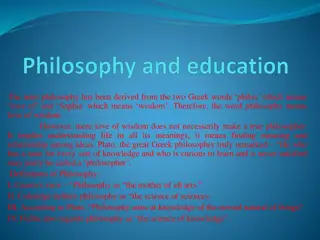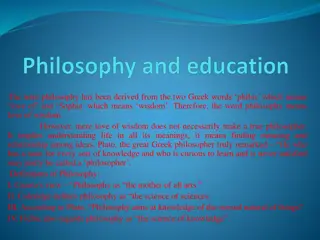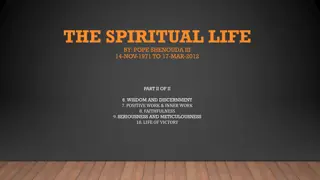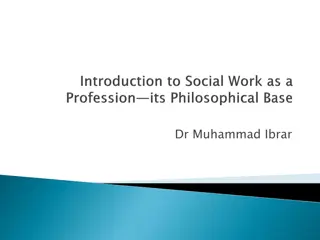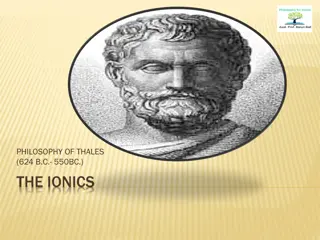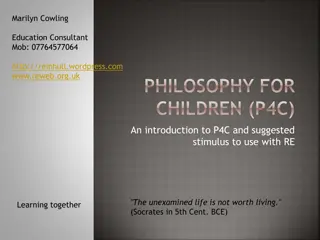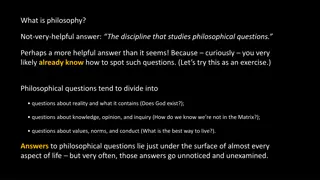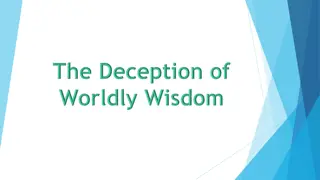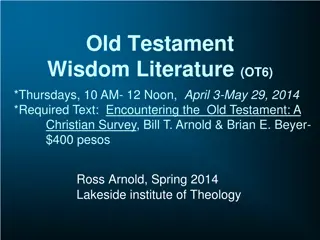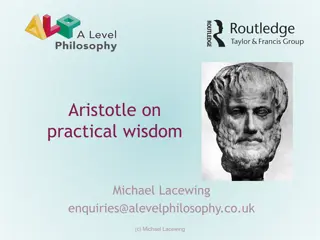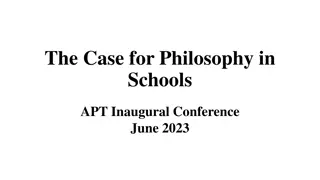Exploring Philosophy: The Love of Wisdom and Fundamental Questions
Delve into the world of philosophy with a focus on the love of wisdom. Explore the basic questions of reality, value, and knowledge. Uncover the branches of philosophy and concepts like metaphysics, epistemology, and axiology. Understand the Greek and Sanskrit roots of philosophical terms and their meanings.
Download Presentation

Please find below an Image/Link to download the presentation.
The content on the website is provided AS IS for your information and personal use only. It may not be sold, licensed, or shared on other websites without obtaining consent from the author. Download presentation by click this link. If you encounter any issues during the download, it is possible that the publisher has removed the file from their server.
E N D
Presentation Transcript
Prepared by: Dr. Sushma Chugh & Dr. Mona Malhotra Gaur Brahman College of Education, Rohtak
Education & Philosophy Revised, 8/30/08
Part I: The Structure of Philosophy Philosophy as the love of wisdom The basic questions and branches of philosophy The branches of the branches and the many philosophical questions that have been raised 3
The Greek word, philosophia, means Plato Sophia the love (philia) loves of wisdom (sophia) (So does Shankara)
The Sanskrit, equivalent of philosophia is: Darshana (Sanskrit), which means vision (more precisely, vision of ultimate reality)
The three most basic philosophical questions are Reality What s what? Value What s good? Knowledge (& Tr uth) What do we know (or what s true)?
Metaphysics - Whats what? Reality Metaphysics is the theory of the ultimate nature of reality It asks the question: what is real? It is simply a belief held by a person as to what is the best explanation of reality Or what reality means, in that person's view
Epistemology and Axiology Epistemology Epistemology is the theory of truth or knowledge It asks the question: what is true, and how do we come to know that truth? Axiology - Axiology is the theory of value or worth It asks the question: what is good and bad? It is made up of two sub-parts: ethics and aesthetics
What do those fancy words mean? Axiology, axiologia axios, axion = value logia = the study, theory or science of something Metaphysics, metaphusika (Gr.) meta = above, beyond, after phusika = the scientific study of the world (phusis = nature) Epistemology, epistemologia episteme = knowledge logia
Some official (& brief) definitions: M A E Metaphysics is the philosophical investigation of the nature of reality, being, or existence. Axiology is the philosophical investigation of the nature of value(s) & of the foundations of value judgments. Epistemology is the philosophical investigation of the nature of knowledge & truth & of the differences between knowledge & opinion & between truth & falsity.
The Branches of the Branches of Philosophy
Metaphysics (Theory of Being) Ontology - being (ontos) in general Philosophical Cosmology - the cosmos Philosophical Theology - God & the gods (Theos & theoi) Philosophical Anthropology - human nature and human existence (anthropos)
Axiology (Theory of Value) Beauty Goodness Aesthetics (philosophy of art) Ethics (moral philosophy) Security Justice Liberty Social & Political Philosophy 13
Epistemology (Theory of Knowledge) Any branches of this branch? (No)
So philosophy as an intellectual discipline has the following structure (or subject matter): Metaphysics Ontology (being in general) Philosophical Cosmology (the cosmos or universe) Philosophical Theology (God & the gods) Philosophical Anthropology (human nature & existence) Axiology Aesthetics (art & aesthetic experience) Ethics (morality) Social & Political Philosophy (society & politics) Epistemology
W hat, then, is philosophy? Philosophy, on the constructive side, is the attempt to formulate rationally defensible answers to certain fundamental questions concerning the nature of reality, the nature of value, & the nature of knowledge and truth; &, on the critical side, it is the analysis, clarification, & evaluation of answers given to basic metaphysical, axiological, & epistemological questions in an effort to determine just how rationally defensible such answers are.


